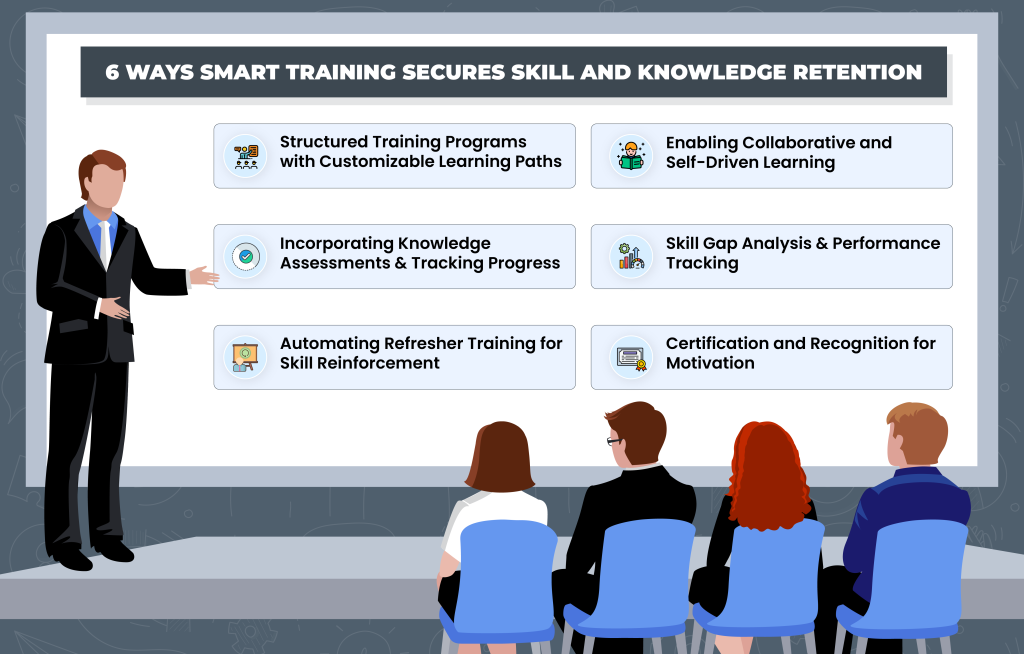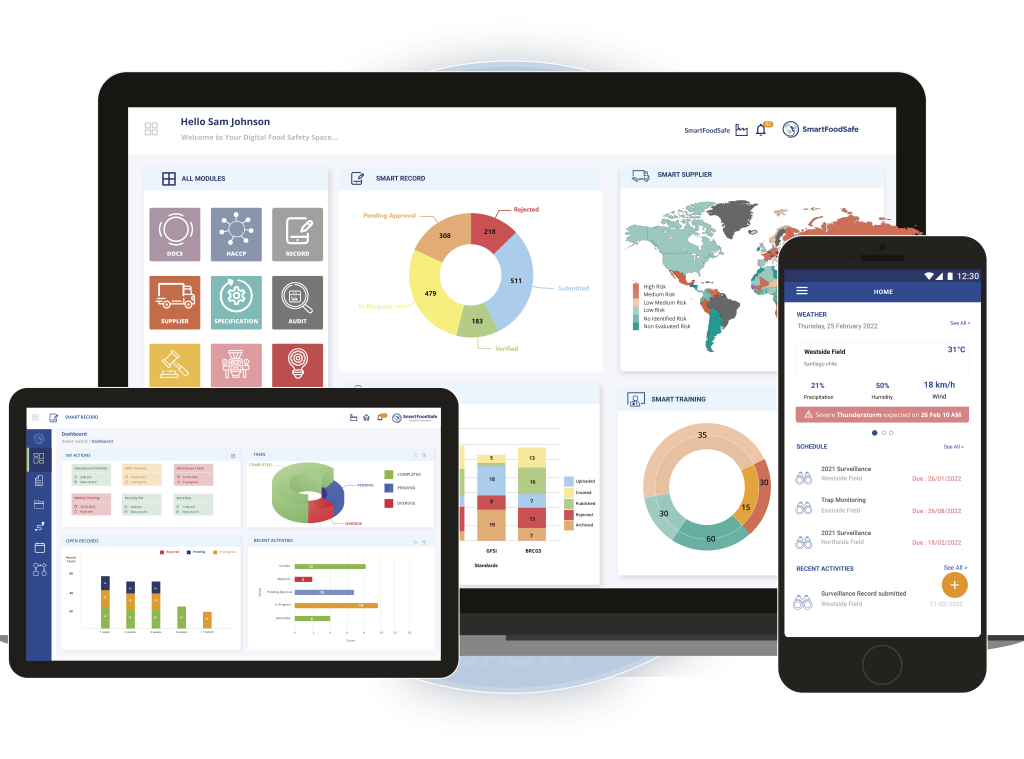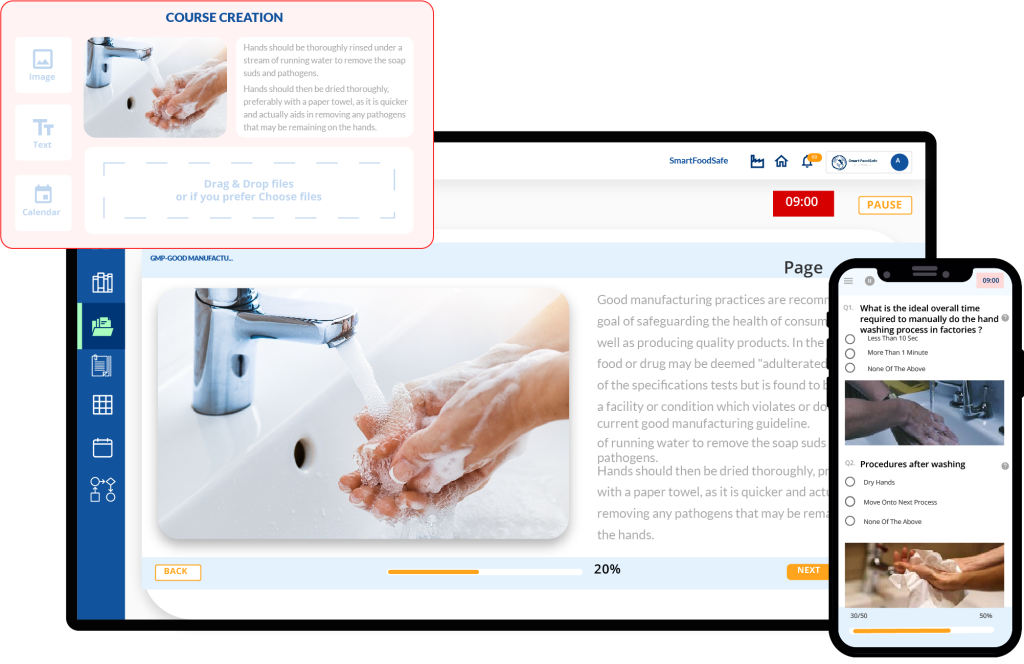


In the present-day business setting that comes across continuously moving trends and developments, the success of any enterprise hinges on its employees being always ready with the necessary knowledge and skill set to work efficiently. This would mean the organizations stay one step ahead in paving the way to equipping their workforce to retain and strengthen their expertise by streamlining training processes and incorporating modern solutions for the same.
Smart Training is a training management platform designed for modern businesses to make their employee training curve easy, convenient, and systematized in a digital environment. This solution makes it possible with a set of specific functionalities to revamp the learning management process in a better and more effective manner.
Boost your food business’s hygiene standards with Smart Food Safe’s tech-driven solutions—streamline 4C processes to yield optimal results, and ensure compliance effortlessly.

Boost your food business’s hygiene standards with Smart Food Safe’s tech-driven solutions—streamline 4C processes to yield optimal results, and ensure compliance effortlessly.
Here are six transformative ways in which Smart Training can assist your business in preserving your team’s skills and abilities:
Smart Training enables businesses to create structured training programs that cater to various employee needs, from onboarding to skill development and compliance training. By grouping courses into training programs, employees follow a clear, designated learning path.
This approach creates an organized framework that helps employees connect and apply learned concepts effectively to their roles, minimizing knowledge gaps.
Smart Training integrates knowledge assessments such as quizzes and Q&A sections directly into the courses. These assessments can be mandatory or optional, graded or non-graded, providing flexibility in evaluating employee progress. Trainers can also provide feedback and guidance on areas of improvement.
With these assessment tools, employees gain the confidence to apply their knowledge and skills while identifying areas for refinement.
Retention isn’t a one-time achievement—it requires reinforcement over time. Smart Training supports refresher training schedules, allowing businesses to automate the process of revisiting important concepts and skills at predefined intervals.
This proactive approach strengthens long-term retention by ensuring employees consistently refresh and refine their skills.
Smart Training promotes both self-learning and group learning, offering flexibility for individual preferences and team collaboration. Self-learning fosters autonomy, while group learning encourages shared knowledge and peer interaction.
By blending autonomy and collaboration, Smart Training encourages a holistic learning environment where employees are actively involved in knowledge sharing and retention.
One of Smart Training’s most valuable features is its ability to conduct skill gap analyses and provide visual representations of individual skills through a skill matrix. The platform also tracks overall user progress and evaluates performance through completed courses and training programs.
This feature ensures that skill retention isn’t left to chance but is continuously monitored and reinforced.
Recognition plays a significant role in retaining skills and knowledge. Smart Training automatically generates certificates upon course completion, providing tangible acknowledgment of employees’ efforts and achievements.
Acknowledging and celebrating accomplishments boosts morale, fosters a sense of pride, and reinforces the importance of retaining skills and knowledge.
In short, Smart Training is capable to enable establishments to take control of their employee training and development through structured programs, knowledge reinforcement, skill gap analysis, and recognition by integrating a tech-enabled learner-focused approach. Smart Training simply aims to upgrade the way businesses cultivate talent by offering the right mechanism they need to succeed in their learning cycle, ensuring every employee remains engaged, qualified, and ready to contribute.

In the present-day business setting that comes across continuously moving trends and developments, the success of any enterprise hinges on its employees being always ready with the necessary knowledge and skill set to work efficiently. This would mean the organizations stay one step ahead in paving the way to equipping their workforce to retain and strengthen their expertise by streamlining training processes and incorporating modern solutions for the same.
Smart Training is a training management platform designed for modern businesses to make their employee training curve easy, convenient, and systematized in a digital environment. This solution makes it possible with a set of specific functionalities to revamp the learning management process in a better and more effective manner.
Boost your food business’s hygiene standards with Smart Food Safe’s tech-driven solutions—streamline 4C processes to yield optimal results, and ensure compliance effortlessly.

Here are six transformative ways in which Smart Training can assist your business in preserving your team’s skills and abilities:
Smart Training enables businesses to create structured training programs that cater to various employee needs, from onboarding to skill development and compliance training. By grouping courses into training programs, employees follow a clear, designated learning path.
This approach creates an organized framework that helps employees connect and apply learned concepts effectively to their roles, minimizing knowledge gaps.
Smart Training integrates knowledge assessments such as quizzes and Q&A sections directly into the courses. These assessments can be mandatory or optional, graded or non-graded, providing flexibility in evaluating employee progress. Trainers can also provide feedback and guidance on areas of improvement.
With these assessment tools, employees gain the confidence to apply their knowledge and skills while identifying areas for refinement.
Retention isn’t a one-time achievement—it requires reinforcement over time. Smart Training supports refresher training schedules, allowing businesses to automate the process of revisiting important concepts and skills at predefined intervals.
This proactive approach strengthens long-term retention by ensuring employees consistently refresh and refine their skills.
Smart Training promotes both self-learning and group learning, offering flexibility for individual preferences and team collaboration. Self-learning fosters autonomy, while group learning encourages shared knowledge and peer interaction.
By blending autonomy and collaboration, Smart Training encourages a holistic learning environment where employees are actively involved in knowledge sharing and retention.
One of Smart Training’s most valuable features is its ability to conduct skill gap analyses and provide visual representations of individual skills through a skill matrix. The platform also tracks overall user progress and evaluates performance through completed courses and training programs.
This feature ensures that skill retention isn’t left to chance but is continuously monitored and reinforced.
Recognition plays a significant role in retaining skills and knowledge. Smart Training automatically generates certificates upon course completion, providing tangible acknowledgment of employees’ efforts and achievements.
Acknowledging and celebrating accomplishments boosts morale, fosters a sense of pride, and reinforces the importance of retaining skills and knowledge.
In short, Smart Training is capable to enable establishments to take control of their employee training and development through structured programs, knowledge reinforcement, skill gap analysis, and recognition by integrating a tech-enabled learner-focused approach. Smart Training simply aims to upgrade the way businesses cultivate talent by offering the right mechanism they need to succeed in their learning cycle, ensuring every employee remains engaged, qualified, and ready to contribute.

Signup to receive latest news, insights and updates on training management